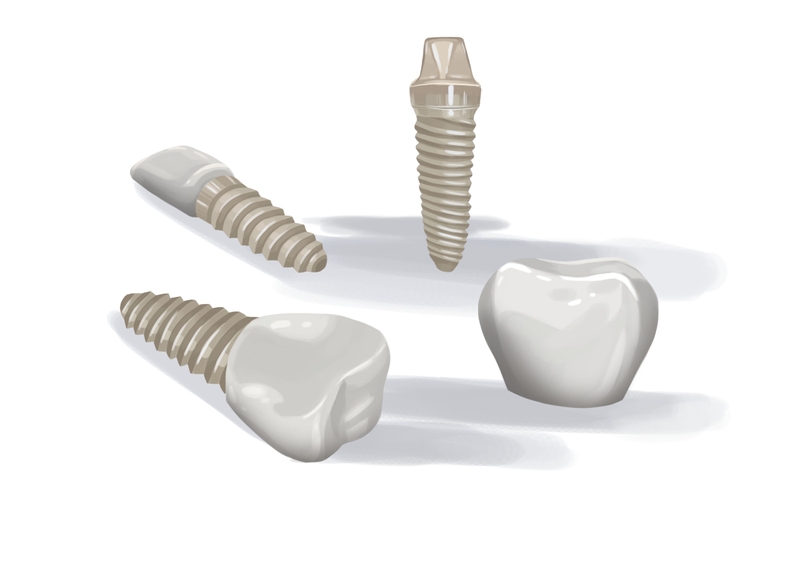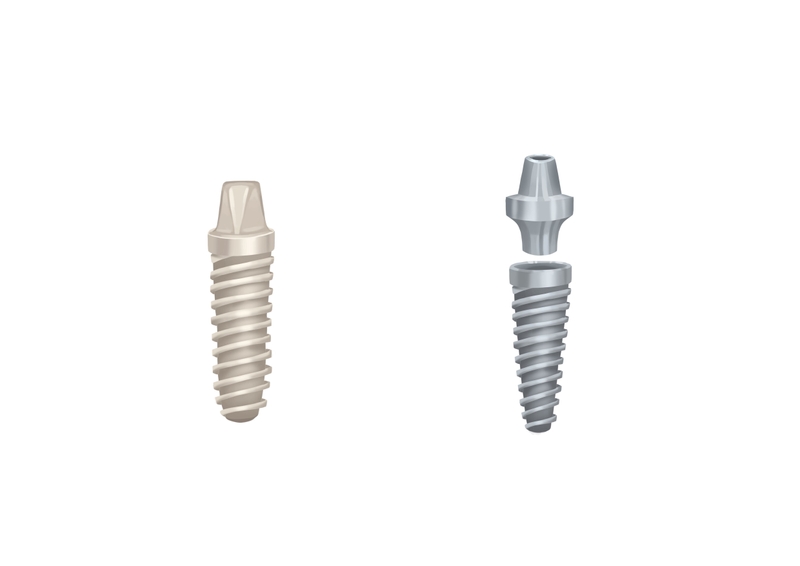- Dental implants made of zirconia are strong and heat-resistant. They are not allergic, do not cause galvanic shock, and are easier to keep clean.
- At the same time, zirconia implants are more expensive and brittle. Clinical studies on innovative zirconia implants are still limited.
- Titanium implants are the current industry standard. They can cause allergies and corrode, but they are cheaper and stronger than zirconia implants.
Ready to wear your best smile? Use Authority Dental to find professional dental implant services in your area. It's easy, fast, and reliable.
What are the key differences between zirconia and titanium implants? Here's everything you need to know.
What are zirconia dental implants?

Picture by Authority Dental under CC 2.0 license
Zirconia is composed of zirconium and oxygen. While it is a transitional metal and retains great strength, the ceramic material is considered metal-free. During the oxidation process, it becomes ceramic, additionally inheriting excellent heat resistance.
Thanks to its chemical structure, zirconia does not:
trigger any chemical reactions,
migrate around the body, or
become corroded.
These material properties make ceramic implants an excellent solution for many patients.
The first zirconia-based artificial teeth were used in 1987. They received FDA approval in 2011. This material is becoming increasingly popular in dentistry, especially among biomimetic and holistic specialists.
Pros of zirconia implants
There are many reasons to consider zirconium when planning to restore teeth with implants. The material carries many benefits over traditional titanium.
Give great aesthetics
Zirconia implants have been proven to work great in the smile zone. This material is naturally white, providing patients with excellent aesthetics. No dark shades poke through the gums. Moreover, since it is non-corrosive, the implants will not become discolored.
Have a high success rate
Zirconia implants have been proven to work great in the smile zone.
This material is naturally white, providing patients with excellent aesthetics. No dark shades poke through the gums. Moreover, since it is non-corrosive, the implants will not become discolored, and there will be no need for whitening.
Safe for patients with metal allergies
Zirconia implants are a viable option for patients with a titanium allergy or who adhere to holistic dental principles. There is no need to take the MELISA test prior to surgery.
There is also no risk of allergic reactions, galvanic shock, or battery effects with ceramic implants, as there is with metal implants.
Resist corrosion and carry less risk of infection
Zirconia does not corrode, which means you do not have to worry about associated infections like peri-implantitis. Studies also show that this material accumulates less plaque, providing better protection against oral infections and gum disease.
Bacteria are less likely to adhere to a zirconia implant than to other materials, thanks to its non-polar structure and smooth surface. What is more, ceramic implant margins are above the gum level. This makes it easier for patients to keep the area clean and preserve gum tissue.
Cons of zirconia implants
However, zirconia implants are not without cons. You should be aware of the drawbacks before deciding which material your implants should be made from.
Tend to be more expensive
One of the most significant downsides of choosing a zirconia implant is the price. They are generally more costly than traditional titanium implants. The cost of manufacture is about $300 more than that of titanium.
What is more, zirconia implants are a relatively new solution. This means fewer specialists are offering their placements. Since there is less competition, the price for placement surgery may be higher as well.
The one-piece design may hinder healing
Zirconia implants are mainly inserted into the jaw in a one-piece design, without a separate abutment. This makes such restorations less flexible and more rigid. The rods may break or fracture when subjected to excessive force.
What is more, without a separate abutment, there is no way to make osseointegration a standalone process. The zirconia implant is inserted in a single step, so biting forces are immediately applied to the restoration. Healing may take longer and be less successful.
Two-piece implants are considered safer and more durable in the dental industry.
Not suitable for full-mouth restorations
One-piece zirconia implants are not suitable for full-mouth restorations. This is because, in order to hold up a full arch, the restoration must have a custom abutment and be screw-retained.
Since zirconia implants are now available in two-piece designs, with a separate abutment, this issue may be overcome. Still, there is limited research on two-piece zirconia dental implants. Dentists may refuse to perform a full-mouth restoration supported by zirconia implants.
Nonetheless, zirconia implants work well as single-tooth replacements or as bridge solutions.
How to choose between zirconium vs titanium dental implants?

Picture by Authority Dental under CC 2.0 license
If you are looking for a solution for tooth loss, you may be considering different implant materials. The best type of implant depends on each patient and their circumstances.
Many patients develop allergies or sensitivities to metal, which can result in inflammation or even failure of the restoration. When choosing ceramic implants, you are minimizing the risk of such complications and treatment costs.
Additionally, a titanium implant can corrode in a moist environment, such as your mouth. The risk is even higher if there is fluoride or more metal in the area, like amalgam fillings. What is more, such conditions increase the likelihood that the rod will migrate into adjacent tissues or even into the lymph nodes.
On the other hand, a zirconia implant is more brittle, and its one-piece design may slow healing. It is a good idea to schedule an appointment with your dentist to discuss whether your ceramic implants can be delivered in two pieces with a custom abutment.
Lee points out: "Titanium is a metal, whereas zirconia is a ceramic—it is completely metal-free. This addresses the two main concerns I hear about titanium: the rare risk of a metal sensitivity, and the cosmetic issue of a dark shadow sometimes showing through thin gums. Zirconia eliminates these concerns, making it an excellent option, particularly for front teeth, where aesthetics are paramount."
Titanium implants
Success and durability supported by research
Industry standard
Always come with a custom abutment
Lower price
Unsuitable for patients with metal allergies
May be visible above the gumline or poke through visually
May give off a taste
Can corrode due to the wet environment of the mouth
Zirconia implants
Great aesthetics
Good choice for patients with metal allergies
No risk of galvanic shock or battery effects
Easier to keep clean
Taste-free
Usually a one-piece implant
More brittle
More expensive option
Lack of clinical studies since it’s a new solution

FAQ
Are zirconia implants more expensive than titanium?
Zirconium implants are usually more expensive than titanium ones. Manufacturing costs are higher, and fewer specialists perform such dental implant surgery.
How long do zirconia implants last?
The long-term success of zirconium dioxide dental implants has not been researched. This is because it is a generally new solution. Nonetheless, dental professionals agree that this strong material can last for many years.
Are zirconia implants metal-free?
Ceramic implants are a great alternative to titanium implants, as they do not trigger metal allergies. Zirconium is classified as a transition metal, but it does not cause adverse reactions.
References
- Current status on lithium disilicate and zirconia: a narrative review
- Zirconia in dental implantology: A review
- Melisa allergic test
- Peri-implantitis
- Long-term Clinical Outcomes and Cost-Effectiveness of Full-Arch Implant-Supported Zirconia-Based and Metal-Acrylic Fixed Dental Prostheses: A Retrospective Analysis
- Group 2 ITI Consensus Report: Prosthodontics and implant dentistry
- Two-piece zirconia implants supporting all-ceramic crowns: A prospective clinical study
- A systematic review of the clinical survival of zirconia implants
Harry Lee, DMD
When a patient asks me to choose between titanium and zirconia implants, I tell them we are weighing decades of proven history against cutting-edge aesthetics. Titanium is the industry standard for a reason: its biocompatibility, known as osseointegration, was discovered in the 1950s, and its long-term success record is unmatched. It is incredibly durable and affordable, which is why it remains the default choice in nearly all complex or high-stress areas of the jaw.